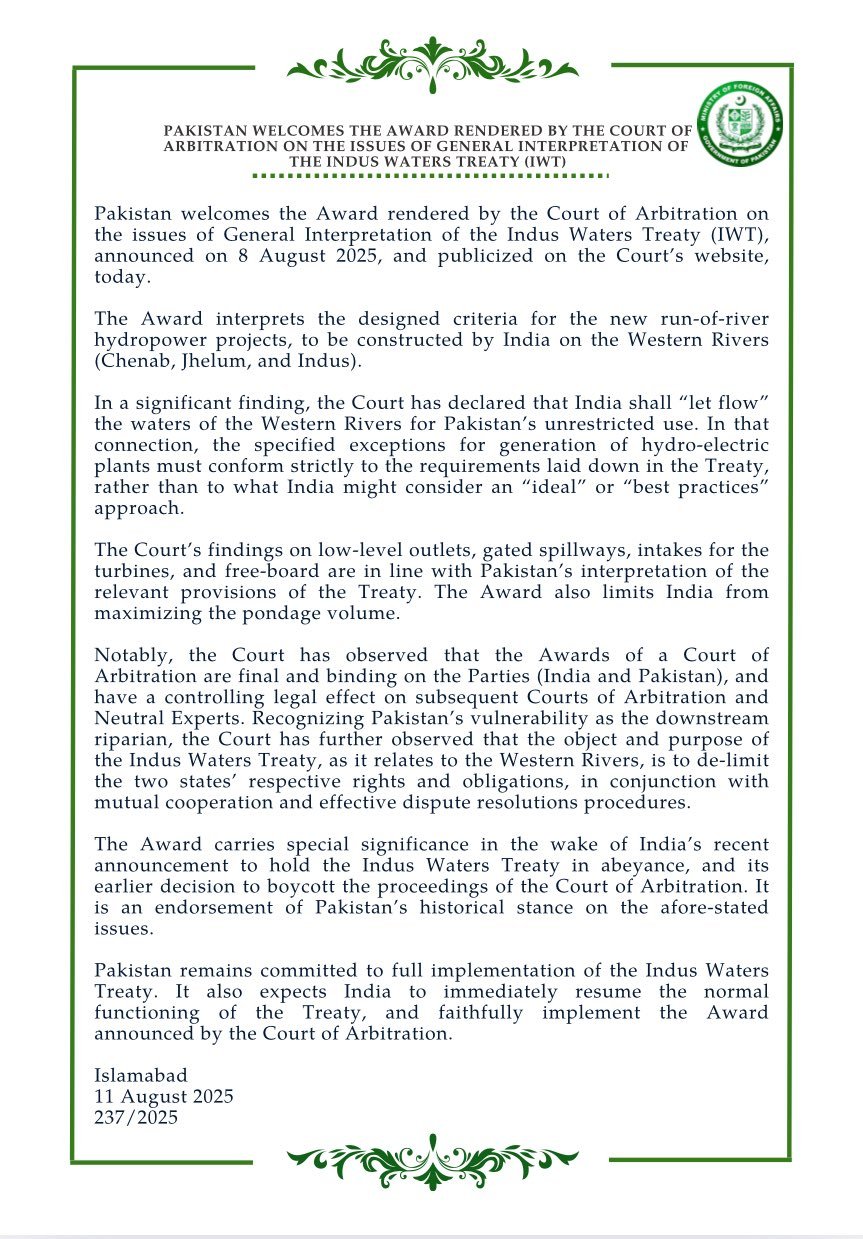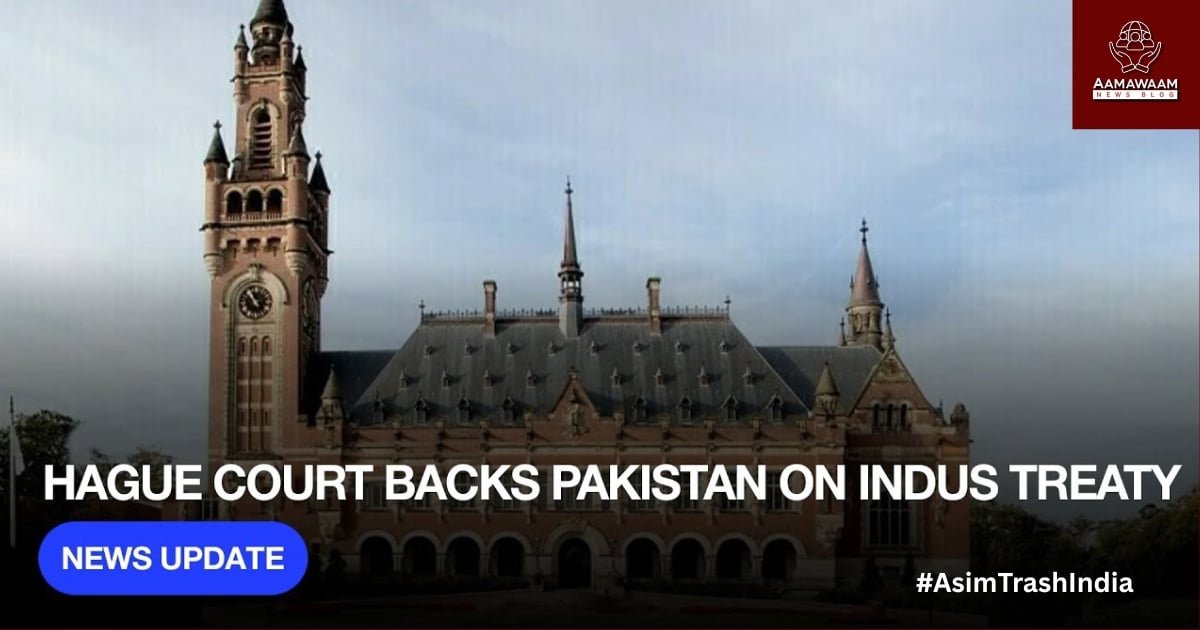On August 8, 2025, the Permanent Court of Arbitration (PCA) in The Hague delivered an “Award on Issues of General Interpretation of the Indus Waters Treaty (IWT)” in a case Pakistan initiated back in 2016. By the time it was made public on August 11, Islamabad’s reaction was swift and celebratory — and with good reason.
In legal terms, this award is decisive. In strategic terms, it is a rare example of international adjudication aligning squarely with Pakistan’s core water security concerns. And in the ever-present theatre of South Asian politics, it is another blow to India’s narrative control, coming on the heels of the BLA’s designation as a Foreign Terrorist Organization by the United States.
🔸 #PCA Press Release | The Indus Waters Western Rivers Arbitration (Islamic Republic of Pakistan v. Republic of India) 🔸
𝗧𝗵𝗲 𝗖𝗼𝘂𝗿𝘁 𝗼𝗳 𝗔𝗿𝗯𝗶𝘁𝗿𝗮𝘁𝗶𝗼𝗻 𝗥𝗲𝗻𝗱𝗲𝗿𝘀 𝗮𝗻 𝗔𝘄𝗮𝗿𝗱 𝗼𝗻 𝗜𝘀𝘀𝘂𝗲𝘀 𝗼𝗳 𝗚𝗲𝗻𝗲𝗿𝗮𝗹 𝗜𝗻𝘁𝗲𝗿𝗽𝗿𝗲𝘁𝗮𝘁𝗶𝗼𝗻 𝗼𝗳 𝘁𝗵𝗲… pic.twitter.com/DDHESOM9TO
— Permanent Court of Arbitration (@PCA_CPA) August 11, 2025
1. “Let Flow” — Three Words That Reinforce the Treaty’s Spirit
The court’s most striking directive is simple yet profound: India must “let flow” the waters of the western rivers — Indus, Jhelum, and Chenab — for Pakistan’s unrestricted use. This isn’t just a semantic victory. It restores the foundational principle of the 1960 treaty: that Pakistan’s rights over the western rivers are not negotiable, and any Indian hydroelectric generation on them must follow the treaty’s strict technical parameters, not New Delhi’s self-defined “best practices.”
By rejecting India’s attempts to reinterpret flexibility into the treaty, the PCA has essentially reaffirmed that the IWT is not an open-ended engineering challenge but a binding legal compact.
the detailed press release can be seen at: Press Release
You May Like To Read: Attacks on State Institutions: Undermining Legitimacy Through Lies
2. Final, Binding, and Controlling
In a region where arbitration awards are often followed by political foot-dragging, the PCA’s declaration that its decisions are final and binding — with controlling legal effect over future neutral expert rulings — is no small matter.
For Pakistan, this shuts the door on India’s past tactic of “forum shopping” — dragging disputes into parallel processes to dilute outcomes. For India, it is a reminder that boycotting proceedings, as it did here, does not erase legal obligations. The court has even addressed this directly: India cannot unilaterally suspend the treaty or dispute settlement processes. That June 2025 supplemental award was the first warning; this August award is the gavel drop.
🔊PR NO.2️⃣3️⃣7️⃣/2️⃣0️⃣2️⃣5️⃣
Pakistan Welcomes the Award Rendered by the Court of Arbitration on the Issues of General Interpretation of the Indus Waters Treaty (IWT).
🔗⬇️https://t.co/fzmDYpXbYj pic.twitter.com/fNkbnDwyrv
— Ministry of Foreign Affairs – Pakistan (@ForeignOfficePk) August 11, 2025
3. Technical Wins with Strategic Impact
On paper, the design parameters for run-of-river projects — low-level outlets, gated spillways, turbine intakes, freeboard — may seem like engineering jargon. In practice, they are the tools India could have used to manipulate river flows under the guise of hydroelectricity.
Pakistan’s interpretation prevailed on all these points. The PCA further curtailed India’s pondage (water storage) capacity by limiting calculations to a seven-day minimum mean discharge. This prevents the kind of reservoir manipulation that can disrupt Pakistan’s sowing seasons and water security.
In essence, the ruling strips India of the legal leeway it has long exploited to play seasonal hydropolitics.
4. A Pattern of Defiance — and Its Diplomatic Cost
India’s decision to hold the treaty “in abeyance” was always more than a legal maneuver; it was a political signal that New Delhi would rewrite the rules if the existing ones didn’t suit it. The PCA’s categorical rejection of this posture — twice in three months — is a legal reprimand with reputational consequences.
India has now been told, in a binding international forum, that its unilateralism has no standing under the IWT. For a country that prides itself on being a responsible global power, this is an uncomfortable footnote in its diplomatic portfolio.
Field Marshal General Asim Munir’s bold and uncompromising stance on defending Pakistan’s water rights reflects both his courage and unwavering commitment to national sovereignty. His clear message to India!! any attempt to build a dam in violation of the Indus Waters Treaty will… pic.twitter.com/mmzhDGQnbN
— Syed Ali Musa Gillani (@SyedMusaGillani) August 10, 2025
5. The Strategic Context — Munir’s Washington Moment
The PCA ruling did not occur in isolation. It landed in the same week the US designated the BLA as a Foreign Terrorist Organization — a development widely seen as a diplomatic gain for Pakistan and a setback for India’s proxy strategies.
Overlay that with Field Marshal Asim Munir’s high-profile engagements in the United States, and the picture becomes clearer: Pakistan’s strategic and diplomatic momentum is aligning across multiple fronts. Whether in counterterrorism or water security, Islamabad is presenting its case effectively and securing tangible wins in forums that matter.
For India, this is doubly frustrating — losing legal ground in The Hague while watching its carefully crafted narratives unravel in Washington.
6. The Road Ahead — Kishenganga, Ratle, and Beyond
While the current award deals with general interpretations, the specific disputes over the Kishenganga and Ratle projects remain pending. If this general award is any indication, Pakistan enters those proceedings with stronger legal precedent and moral weight.
However, victories in law must be matched by vigilance in implementation. India has, in the past, used delay tactics and on-the-ground engineering changes to outpace arbitration outcomes. Pakistan must now combine diplomatic follow-up with technical monitoring to ensure the letter and spirit of this award are enforced.
You May Like To Read: Reimagining Pakistan’s Political Landscape: Unity Beyond August 14
7. Beyond the Courtroom — Narrative and National Resilience
This win should also be read through the lens of narrative warfare. For years, Indian media has framed Pakistan’s water disputes as obstructionism or paranoia, while portraying Indian projects as benign. The PCA’s findings dismantle that portrayal — not in an op-ed, but in a binding legal award.
It gives Pakistan a platform to push for greater international scrutiny of India’s dam-building spree and to demand compliance without being accused of politicising the issue. The challenge now is to sustain this narrative in global forums, ensuring that the technical clarity achieved in The Hague translates into policy clarity worldwide.

Conclusion: The Flow of Law and the Flow of Rivers
The PCA’s August 8 award is more than a legal document; it is a reaffirmation that treaties matter, that unilateralism has limits, and that persistence in the pursuit of justice can yield results — even in an era where geopolitics often overshadows law.
For Pakistan, it is a vindication of a decade-long legal effort. For India, it is a cautionary tale about overreach and the costs of ignoring binding frameworks. And for the region, it is a reminder that the rivers that sustain life cannot be turned into tools of coercion without consequence.
In the words of the award itself, the western rivers must “let flow” — a principle that now stands as both a hydrological necessity and a legal command. And if Pakistan continues to pair such legal victories with strategic diplomacy — the kind we have just witnessed in Washington — then the currents, both political and literal, may be turning in our favour.







